Return-to-Series: One Punch Man 2
- Joseph Lutholtz
- Aug 28, 2019
- 7 min read

Alternative Names: One-Punch Man, One Punch-Man, OPM, OnePun
Score: 7/10, 4/5
Overall Score: 8/10, 5/5
Length: 2 Seasons of 12 Episodes
Genre: Action, Comedy, Super Powers, Political
Summary: Capable of leveling cities and reducing titanic beasts to offal with a single punch, the world's strongest hero isn't much of a hero at all. While the rest of hero society takes care of the day-to-day chores of protecting the citizenry from villains and monsters, Saitama simply deals with whatever crosses his path to and from the supermarket. For him, being a hero isn't as fun as he'd thought it'd be. Since everything he fights goes down in a single punch, there's just no fulfillment in fighting anymore. Yet, as he learns from his "apprentice" Genos and all the other heroes of this world, there's more to being a hero than just being strong. It helps, sure, but you first need a reason to make the hero's life worthwhile.
Review: Call me a pessimist but I always get a twinge of worry whenever I see a sequel season announcement. If it's a show I really liked, I'm obviously going to be excited like everyone else but I've been burned too many times for it not to color my reactions. No matter how excited I get, there'll always be a little niggling voice in the back of my mind that reminds me that sequels are always a gamble. With a new season comes a near-infinite number of possibilities that something can go wrong. As property rights change hands, change production staff, or simply tweak things here and there, those risks increase exponentially. To be fair, though, there is also the possibility that things will turn out better than they ever were. Whether it's simply the continuation of an overall story or a shift in focus or perspective, sequel seasons do have the possibility of outclassing their predecessors. In other words, a sequel season means we open ourselves up to another tragedy like Tokyo Ghoul which has, weirdly enough, consistently failed to make a good second season. Alternatively, though, we could get another Attack on Titan which used its new seasons to tackle new narratives, flesh out characters, and develop ideas that effectively built on one another until the series was ready to bring it all to bear in one, grand event. Oddly enough, though, the second season of One Punch Man seems to be both a failure and a success at the same time. On the one hand, you have an objectively weaker continuation of a beloved franchise. On the other hand, Season 2 builds on the world and characters introduced in the first season in a manner that makes it easier to get more invested in Saitama, his fellow heroes, and the society that supports them.
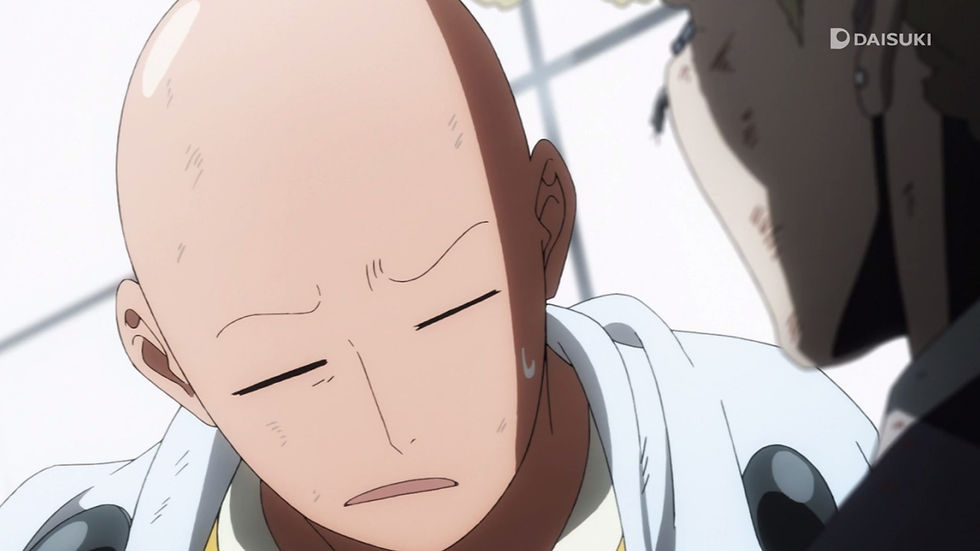
In other words, I think the coin flip that would have determined this show's
success or failure ended up landing on its side.
One Punch Man, as a series, is a solid example of how an anime might effectively build up to a second season. In its first season, we are introduced to the world of One Punch Man and its characters as they relate to the series protagonist Saitama. For all intents and purposes, he is the central figure of that season. We're meant to get invested in him as a person and his very human struggle to find meaning and fulfillment in his life. More specifically, his ongoing struggle with depression and boredom now that his dream has become just as mundane as his old, normal life is meant to be comedically relatable to the act of growing up only to realize that adult life is just more work. With this set-up of a depressed hero smacking down incredible threats like it's just another Monday, One Punch Man set itself up as a fantastic satire on the shounen genre. Gone is the cathartic power fantasy and the age-old lesson of friendship overcoming all. In its place we just have a hero doing his job with the least effort possible while every other hero struggles and politics their way into being hero alive, totally unaware of Saitama's very existence. Then, just like Saitama struggles to find meaning in his mundane life, the comedy also takes a bit of a samey quality as the show's foundational pun starts to grow stale. After all, the general gag of Saitama being underestimated by everyone around him and saving the world when no one is looking is only going to work so many times. So, with that comedic deadline approaching the first season wraps everything up with one last big threat that Saitama, again, resolves without much effort. With that conclusion, the series is set to just end there without necessarily promising anything more to come. Yet, at the same time, there is still a great deal that could be addressed if a second season got greenlit later on.
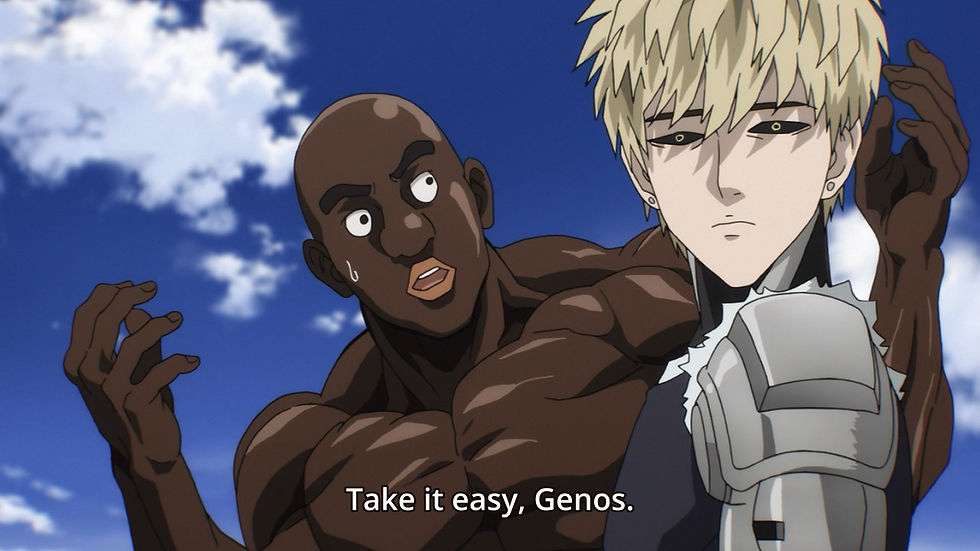
Which it obviously did.
So, building on the gaps left by the first season, Season 2 of One Punch Man sets itself up to focus not so much on Saitama as it does the world around him. While he's still a key part, the show isn't laser-focused on him. Instead, it focuses on building a world in which a hero like Saitama might reasonably exist. From the word go, we learn more about the Hero Association and how it operates in general, rather than specifically how it manages to repeatedly ignore Saitama's existence as the world's strongest hero. The details of the organization itself might be simplistic but enough is established to make their existence believable. Namely, while organization might be held aloft by the heroes it manages and promotes, the Association itself is functionally run by a bunch sect of self-interested autocrats who are using the heroes to suit their interests rather than work for the good of humanity as a whole. Then, to further that image, we see how various heroes function within that system. Some of the strongest, like Genos, Tsubaki, and Bang, have the privilege of not needing to pay attention to the politics of the system and simply do their duties as they see fit. Meanwhile, weaker heroes like Fubuki try to consolidate power within the hero ranking caste system by forming teams better equipped to deal with larger threats and keep other heroes lower on the totem pole.

Yet somehow she still manages to be "best girl."
With that system of in-fighting and politicking established, though, the second season also primes itself to address the other key factor in this world: the existence and growth of villain culture. Whether it be from heroes trying to outdo their fellow heroes by turning to darker powers or simply a disgruntled civilian failing to be noticed the heroes around them, the heroes' horribly flawed system offers a solid explanation for how villains can even exist in this world where superpowers are commonplace. To offer a solid example of this, we're introduced to two key villains in this season. The first is, in a bit of humor, the self-titled Monster Association that has managed to develop without the Hero Association noticing simply because they laid claim to a ruined slum no hero would dare live in (except Saitama who is just too dense to notice them). Like the Hero Association, though, there isn't anything special about the Monster Association. Where the Hero Association is corrupt, because of course they would be, the monsters are functionally evil for the sake of being evil. There's no grand scheme or political message they have to offer, either in the story or narratively, other than a mad desire to kill people.
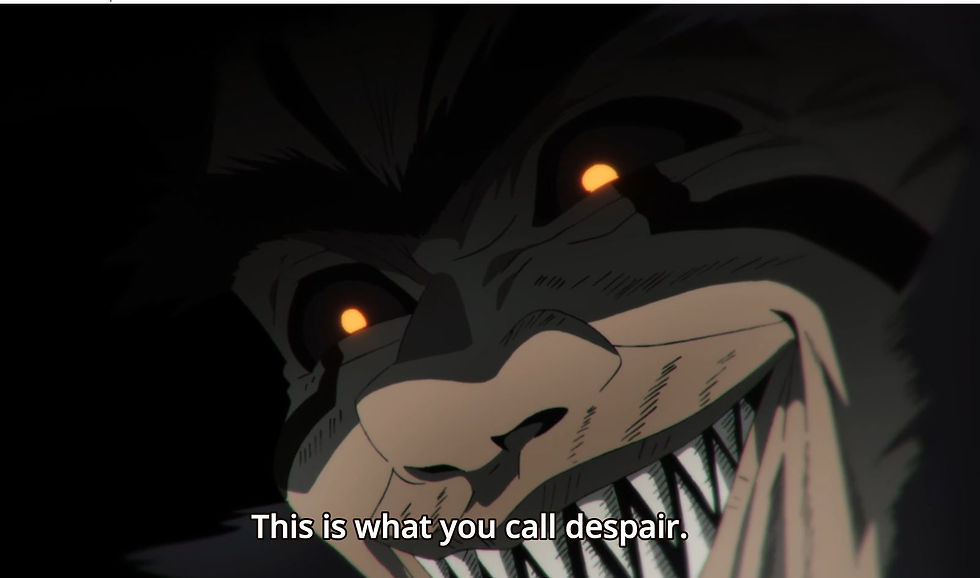
Among other things.
In comparison, the season's second villain, Hero Hunter Garo, is a far more interesting and compelling character. Like a villainous version of Saitama, Garo is a villain struggling to make his ambitions of being perceived as a monster a reality. Having always been a fan of the monsters who served as criticisms of human society and undermined authority, Garo sets out to "hunt" heroes and prove how ineffectual the Hero Association is. While he often forgets his ultimate goal as he gets high on facing a tough opponent, Garo still proves himself to be a far more engaging character simply because he represents what happens to those who fall through the cracks or outright rebel against this hero society. His story might not be as complex or thoughtful as the ambitions of the Villain League in My Hero Academia but Garo's personal rebellion against this corrupt hero society still works to flesh out this world better than Saitama's depression ever could on its own.
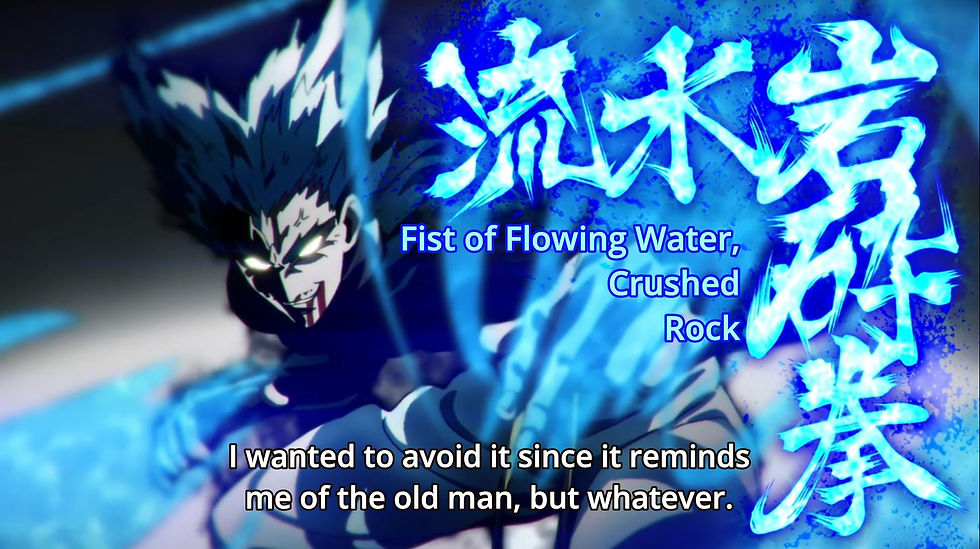
I'd even go so far as to call Garo a more engaging character than the titular One Punch Man.
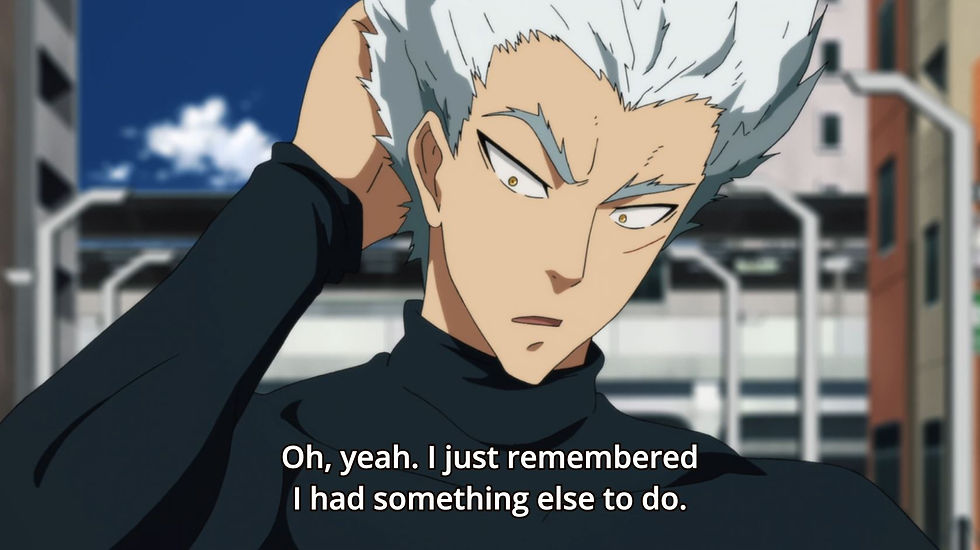
That focus on world-building via building on a larger ensemble cast of characters is more or less where the second season of One Punch Man succeeds as a sequel. With this expansion of characters and players in the politics of the world, we gain a clearer understanding of where Saitama stands in the larger scheme of things and how he could end up being a nobody when the dust settles. As many people have rightly pointed out, the character of Saitama only really works when he's forced to interact with a world that doesn't know how to deal with him. He is, in many ways, meant to be both a parody of Superman and a solid example of how to do a Superman story well--i.e. focusing on how Superman's actions or inaction can shake the world to its core. With the existence of a number of heroes with more personality and drive than our titular main character and a world that he can call home, we see how this world slowly comes to rely on him while he spends all his time stuck inside his own head, believing that he'll never manage to be the hero he wants to be.
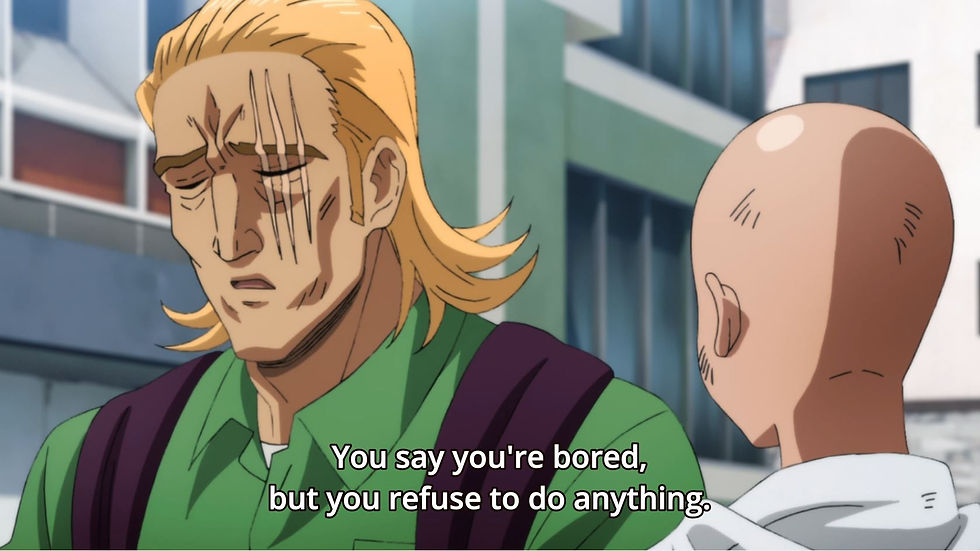
He might be a fraud but King is legitimately the best character in this entire series
just because he's the only person willing to call Saitama out on his bullshit.
Unfortunately, that's pretty much where my praise for the show's second season ends. Beyond its bare-bones attempts at world-building and character development doing what little it can to revitalize interest in the One Punch Man series, the second season is an absolute disaster in every other respect. Particularly from a production angle, Season 2 was an absolute flop in comparison to its predecessor. Whether it be the garish chrome sheen that covered anything metal to the abysmal animation and disappointing visual effects, none of the skill or effort seen in the first season was brought to bear on this new installment. Yet, in spite of that drop in production value, it is worth noting that people still loved it anyway, myself included. So, while I might be disappointed that Season 2 didn't live up to the hype of its predecessor, it did give me something I could appreciate. I certainly won't be singing my praises of it any time soon but I don't find myself willing to bash this series for its shortcomings either. All I reasonably can do is say that I'm glad that One Punch Man got a semi-decent sequel and hope that the next season that was teased will even better.


Comments